-
Who we are
WHO WE AREThe International Organization for Migration (IOM) is part of the United Nations System as the leading inter-governmental organization promoting since 1951 humane and orderly migration for the benefit of all, with 175 member states and a presence in 171 countries.
-
Our Work
Our WorkAs the leading inter-governmental organization promoting since 1951 humane and orderly migration, IOM plays a key role to support the achievement of the 2030 Agenda through different areas of intervention that connect both humanitarian assistance and sustainable development.
What We Do
What We Do
Partnerships
Partnerships
Highlights
Highlights
- Where we work
-
Take Action
Take Action
Work with us
Work with us
Get involved
Get involved
- Data and Research
- 2030 Agenda
Mediterranean Migrant Arrivals Reach 27,482 in 2018; Deaths Reach 636
Geneva – IOM, the UN Migration Agency, reports that 27,482 migrants and refugees entered Europe by sea through the first 20 weeks of 2018, with about 38 per cent arriving in both Italy and Greece, with the remainder (23%) arriving in Spain.
This compares with 58,921 arrivals across the region through the same period last year and about 190,977 at this time in 2016.
In other words: Mediterranean arrivals at this point in 2018 are running at under half last year’s level on this date, and less than 15 per cent of 2016’s volume at this point in the year.
Also worth noting: in the month of May arrivals to Italy rank third – trailing both Spain and Greece, which recorded nearly two and a half times more arrivals than Italy (see chart below).
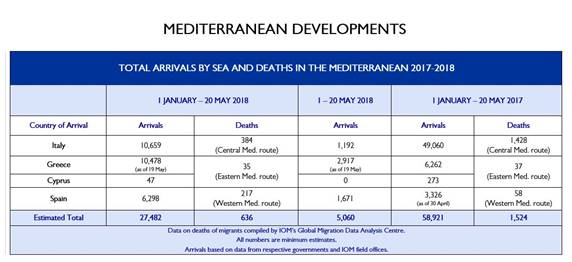
IOM Rome’s Flavio Di Giacomo noted that the 10,659 migrants who are registered as having arrived by sea to Italy this year is an amount over 78 per cent less than that reported last year in the same period, when 49,060 irregular migrants and refugees arrived in Italy and a 67 per cent decline from the 32,292 arriving to this point in 2016.
Arrivals to Italy through the first three weeks of May are about one-tenth of last year’s May volume, and one-sixth of that of May 2016 (see chart below).
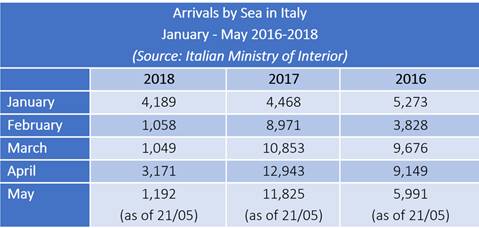
Last year’s May total nearly doubled over the last 10 days of the month, from 11,825 to 22,993 arrivals – for an average of 1,000 irregular migrants arriving per day during the final third of the month. Most of those migrants left from Libya. The previous year (2016) witnessed a similar phenomenon, with over 14,000 men, women and children entering Italy by sea over the month’s final 10 days.
It appears unlikely such arrival numbers will be duplicated this month, although sudden surges have happened in the past. This is, in part, because IOM continues to return migrants from Libya to their home countries under its Voluntary Humanitarian Returns (VHR) programme which has flown home 26,383 men women and children to 30 countries since the start of 2017.
IOM Libya’s Christine Petré reported Monday that on 17 May, IOM assisted 140 migrants in returning home to Niger, Egypt and Mali on one chartered and two commercial flights. Among the migrants were four medical cases and three unaccompanied migrant children. IOM Libya has assisted 13,252 to leave Libya by air since the scale-up phase of this programme began on 28 November last year. Those 13,252 departures are part of the overall total of 26,383 migrants who have returned from Libya with IOM’s assistance since 1 January 2017.
IOM Greece’s Kelly Namia reported Monday that over four days (16-19 May) the Hellenic Coast Guard shared details of four incidents requiring search and rescue operations off the island of Lesvos, Samos and Rhodes. The Coast Guard rescued 52 migrants and transferred them to those islands.
Namia reported that besides those 52 who were rescued, another 410 migrants arrived during the four days, landing in Samos, Chios, Kos and Rhodes and bringing to 10,478 the total number of irregular migrants entering Greece via sea since 1 January – for an average of around 79 persons per day.
April saw 3,083 migrant arrivals via the Eastern Mediterranean. Through the first 19 days of May nearly that number (2,917) have arrived, or an average of over 150 per day (see charts below).
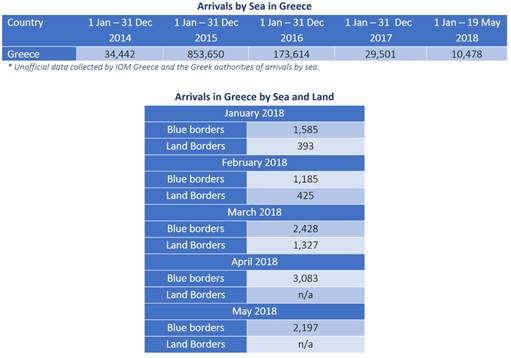
Ivona Zakosa-Todorovska,following the increase in arrivals through the Eastern Mediterranean route, with estimated 12,604 land and sea arrivals reported to Greece (12,161) and Bulgaria (443), notes IOM's DTM unit in the region is recording a 35% increase compared to 8,951 reported in the same period 2017. She added that an intensified migration flow has been observed in several transit countries along the Western Balkans route.
In the first two weeks of May 2018, authorities in Bosnia and Herzegovina, Montenegro and Albania apprehended more than 2,300 irregular migrants bringing the total to 6,098 men, women and children apprehended since the beginning of the year. This represents a tenfold increase in apprehensions compared to the same January to mid-ay 2017 period, when 578 irregular migrants had been intercepted in the countries concerned (217 apprehended just in May 2017). One third of all registered irregular migrants in the countries on this route were of Syrian origin (2,046) followed by those arriving from Pakistan (16%), Afghanistan (8%), Iraq (7%) and Libya (7%) Moroccan nationals comprised additional 6% of the overall caseload, same as those arriving from Iran (6%) while 240 Algerian nationals comprised another 4% of the overall population.
In Spanish waters, so far this year IOM Madrid’s Ana Dodevska reported Monday that a total of 1,671 migrants have been rescued on the Western Mediterranean route through 20 days in May – compared with 835 for the entire month of May last year. That brings to 6,298 the total number of men, women and children have been rescued trying to enter Spain by sea this year (see charts below).
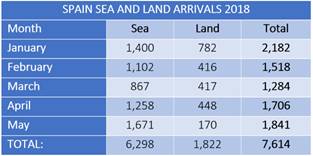
To date, 75 per cent of the arrivals to Spain were registered by sea route and the rest 25 per cent of arrivals were registered by land route (to Ceuta and Melilla).
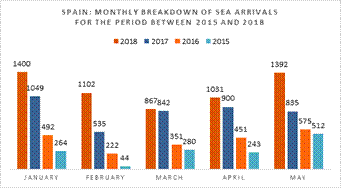

Worldwide, IOM’s Missing Migrants Project has recorded 1,120 people who died or went missing while migrating in 2018. In the Mediterranean alone, 636 migrants are estimated to have died this year. The MMP team was able to confirm last week that on 12 May, the body of an Eritrean man was retrieved by the Libyan Coast Guard during a rescue operation off the coast of Al Khums, Libya.
In Europe, a two year-old migrant girl, thought to be Kurdish, was discovered dead on 17 May in a van intercepted by police on the E42 highway, near Mons, Belgium.
|
Global Migrant Deaths |
||
|
REGION |
2018 |
2017 |
|
Mediterranean |
636 |
1,524 |
|
Europe |
21 |
22 |
|
Middle East |
52 |
35 |
|
North Africa |
35 |
252 |
|
Horn of Africa |
62 |
103 |
|
Sub-Saharan Africa |
73 |
40 |
|
Central Asia |
52 |
- |
|
Southeast Asia |
46 |
45 |
|
South Asia |
4 |
1 |
|
East Asia |
3 |
- |
|
North America |
- |
- |
|
US/Mexico border |
80 |
114 |
|
Central America |
27 |
32 |
|
Caribbean |
19 |
92 |
|
South America |
10 |
- |
|
TOTAL |
1,120 |
2,260 |
Missing Migrants Project data are compiled by IOM staff but come from a variety of sources, some of which are unofficial. To learn more about how data on migrants’ deaths and disappearances are collected, click here.
Latest Mediterranean Update infographic here
For latest arrivals and fatalities in the Mediterranean, please visit: http://migration.iom.int/europe
Learn more about the Missing Migrants Project at: http://missingmigrants.iom.int
For more information, please contact:
Joel Millman at IOM HQ, Tel: +41 79 103 8720, Email: jmillman@iom.int
Flavio Di Giacomo, IOM Coordination Office for the Mediterranean, Italy, Tel: +39 347 089 8996, Email: fdigiacomo@iom.int
Hicham Hasnaoui, IOM Morocco, Tel: + 212 5 37 65 28 81, Email: hhasnaoui@iom.int
Kelly Namia, IOM Greece, Tel: +30 210 991 2174, Email: knamia@iom.int
Ivona Zakoska, IOM Regional DTM, Tel: + +43 1 5812222, Email: izakoska@iom.int
Julia Black, IOM GMDAC, Germany, Tel: +49 30 278 778 27, Email: jblack@iom.int
Christine Petré, IOM Libya. Tel. +216 29 240 448 Email : chpetre@iom.int
Ana Dodevska, IOM Spain, Tel: +34 91 445 7116, Email: adodevska@iom.int
Myriam Chabbi, IOM Tunisia, Mobile +216 28 78 78 05, Tel: +216 71 860 312 ext. 109, Email: mchabbi@iom.int
